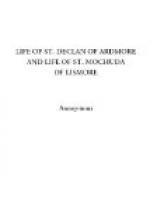Mochuda, now grown old and of failing powers and strength, was wearied and worried by the incessant clamour of building operations—the dressing of stones and timber—carried on by the multitude of monks and artisans. He therefore by consent and counsel of the brethren retired to a remote, lonely place situated in a glen called “Mochuda’s Inch” below the great monastery. He took with him there a few monks and built a resplendent monastery; he remained in that place a year and six months more leading a hermitical life. The brethren and seniors of the community visited him (from time to time) and he gave them sound, sweetly-reasoned advice. He received a vow from each to follow his Rule, for he was the support of the aged, the health-giver to the weak, the consoler of the afflicted, the hope-giver to the hopeless, the faith-giver to the doubting, the moderator and uniter of the young.
As soon as Mochuda saw the hardship to the visiting brothers and elders of the descent from Lismore and the ascent thereto again—knowing at the same time that his end was approaching—he ordered himself to be carried up to the monastery so that the monks might be saved the fatigue of the descent to him. Then it pleased God to call to Himself His devoted servant from the troubles of life and to render to him the reward of his good works. He opened the gates of heaven then and sent to him a host of angels, in glory and majesty unspeakable. When Mochuda saw the heavens open above him and the angel band approaching, he ordered that he be set down in the middle of the glen and he related to the seniors the things that he had seen and he asked to receive the Body of Christ and he gave his last instruction to the monks—to observe the Law of God and keep His commands. The place was by the cross called “Crux Migrationis,” or the cross from which Mochuda departed to Glory. Having received the Body and Blood of Christ, having taught them divine doctrines, in the midst of holy choirs and of many brethren and monks to whom in turn he gave his blessing and the kiss of peace according to the rule, the glorious and holy bishop departed to heaven accompanied by hosts of angels on the day before the Ides of May [May 14], in his union with the Holy Trinity—Father, Son, and Holy Ghost, for ever and ever. Amen.
Finit 7ber [September] 4th, 1741.
NOTE 1
One of our scribe’s predecessors omitted a word or two from the text here, with disastrous results to the sense. The Latin Life comes to our aid however and enables us to make good the omission; the latter, by the way, puzzles our scribe who is like a man fighting an invisible enemy—correcting a text of which he does not know the defect. Insertion of the words “walking backwards” immediately after “church,” in the angel’s answer, will enable us to see the original writer’s meaning. The text should probably read:




